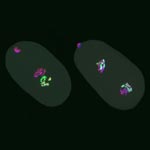
Chemical tags that cells attach to DNA or to DNA-packaging proteins across the genome—called epigenetic marks—can alter gene activity, or expression, without changing the underlying DNA code. As a result, these epigenetic changes can influence health and disease. But it’s a matter of debate as to whether and how certain epigenetic changes on DNA-packaging proteins can be passed from parents to their offspring.
In studies with a model organism, the worm C. elegans, researchers led by Susan Strome of the University of California, Santa Cruz, have offered new details that help resolve the debate.
Strome’s team created worms with a genetic change that knocks out the enzyme responsible for making a particular methylation mark, a type of epigenetic mark that can turn off gene expression at certain points of an embryo’s development. Then the scientists bred the knockout worms with normal ones. Looking at the chromosomes from the resulting eggs, sperm and dividing cells of embryos after fertilization, the researchers found that the methylation marks are passed from both parents to offspring. The enzyme, however, is passed to the offspring just by the egg cell. For embryos with the enzyme, the epigenetic marks are passed faithfully through many cell divisions. For those without it, the epigenetic mark can be passed through a few cell divisions.
Because all animals use the same enzyme to create this particular methylation mark, the results have implications for parent-to-child epigenetic inheritance as well as cell-to-cell inheritance in other organisms.
This work was funded in part by NIH under grants R01GM034059, T32GM008646 and P40OD010440.
Learn more:
University of California, Santa Cruz News Release
Dynamic DNA Section from The New Genetics Booklet

